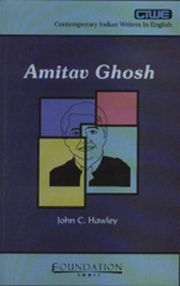4 results in Contemporary Indian Writers in English

Raja Rao
- An Introduction
-
- Published by:
- Foundation Books
- Published online:
- 05 March 2012
- Print publication:
- 02 January 2011

Mahesh Dattani
- An Introduction
-
- Published by:
- Foundation Books
- Published online:
- 26 October 2011
- Print publication:
- 28 November 2008

Amitav Ghosh
- An Introduction
-
- Published by:
- Foundation Books
- Published online:
- 26 October 2011
- Print publication:
- 18 March 2005

Vikram Seth
- An Introduction
-
- Published by:
- Foundation Books
- Published online:
- 26 October 2011
- Print publication:
- 02 February 2008

